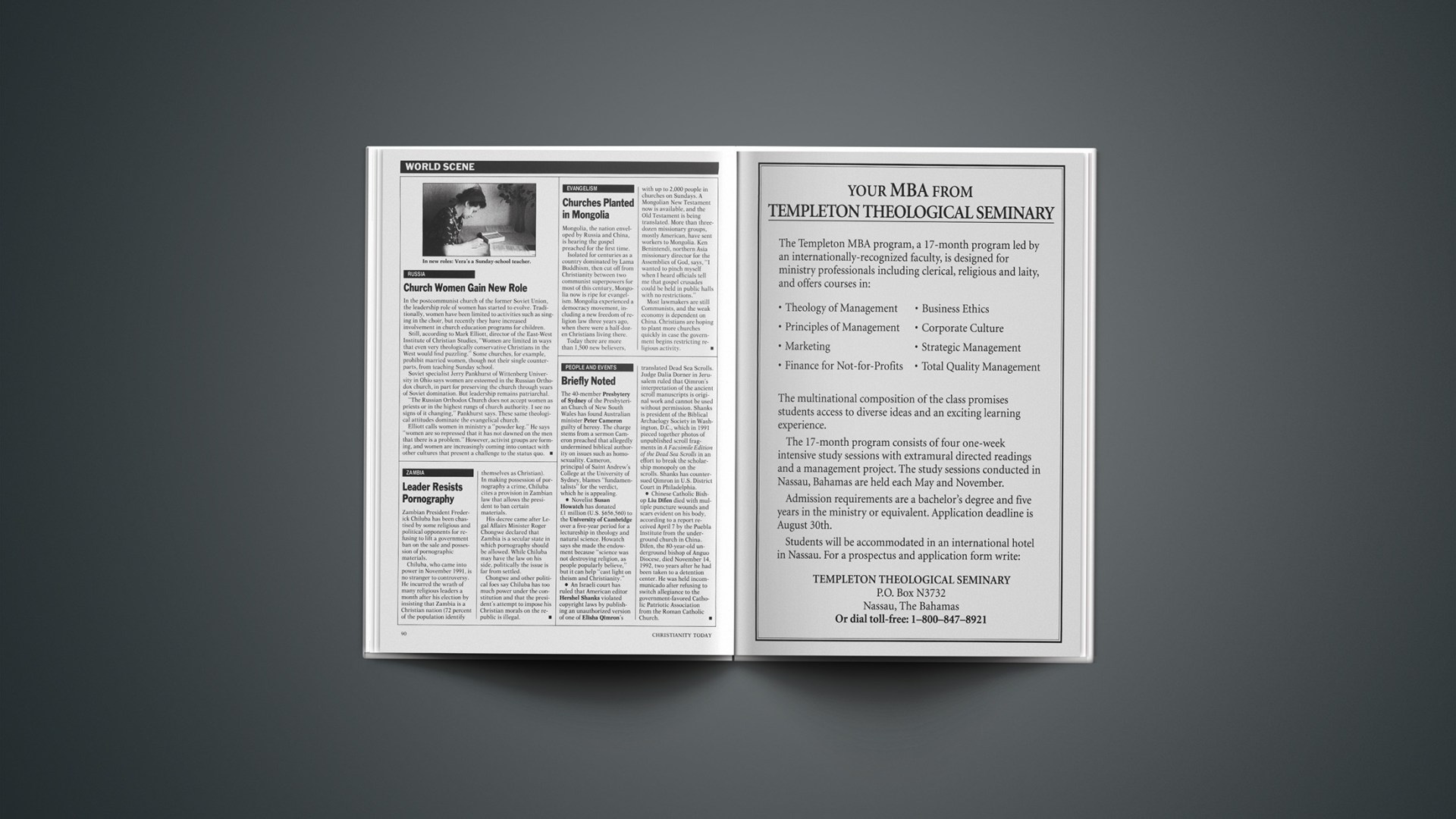RUSSIA
Church Women Gain New Role
In the postcommunist church of the former Soviet Union, the leadership role of women has started to evolve. Traditionally, women have been limited to activities such as singing in the choir, but recently they have increased involvement in church education programs for children.
Still, according to Mark Elliott, director of the East-West Institute of Christian Studies, “Women are limited in ways that even very theologically conservative Christians in the West would find puzzling.” Some churches, for example, prohibit married women, though not their single counterparts, from teaching Sunday school.
Soviet specialist Jerry Pankhurst of Wittenberg University in Ohio says women are esteemed in the Russian Orthodox church, in part for preserving the church through years of Soviet domination. But leadership remains patriarchal.
“The Russian Orthodox Church does not accept women as priests or in the highest rungs of church authority. I see no signs of it changing,” Pankhurst says. These same theological attitudes dominate the evangelical church.
Elliott calls women in ministry a “powder keg.” He says “women are so repressed that it has not dawned on the men that there is a problem.” However, activist groups are forming, and women are increasingly coming into contact with other cultures that present a challenge to the status quo.
ZAMBIA
Leader Resists Pornography
Zambian President Frederick Chiluba has been chastised by some religious and political opponents for refusing to lift a government ban on the sale and possession of pornographic materials.
Chiluba, who came into power in November 1991, is no stranger to controversy. He incurred the wrath of many religious leaders a month after his election by insisting that Zambia is a Christian nation (72 percent of the population identify themselves as Christian).
In making possession of pornography a crime, Chiluba cites a provision in Zambian law that allows the president to ban certain materials.
His decree came after Legal Affairs Minister Roger Chongwe declared that Zambia is a secular state in which pornography should be allowed. While Chiluba may have the law on his side, politically the issue is far from settled.
Chongwe and other political foes say Chiluba has too much power under the constitution and that the president’s attempt to impose his Christian morals on the republic is illegal.
EVANGELISM
Churches Planted in Mongolia
Mongolia, the nation enveloped by Russia and China, is hearing the gospel preached for the first time.
Isolated for centuries as a country dominated by Lama Buddhism, then cut off from Christianity between two communist superpowers for most of this century, Mongolia now is ripe for evangelism. Mongolia experienced a democracy movement, including a new freedom of religion law three years ago, when there were a half-dozen Christians living there.
Today there are more than 1,500 new believers, with up to 2,000 people in churches on Sundays. A Mongolian New Testament now is available, and the Old Testament is being translated. More than three-dozen missionary groups, mostly American, have sent workers to Mongolia. Ken Benintendi, northern Asia missionary director for the Assemblies of God, says, “I wanted to pinch myself when I heard officials tell me that gospel crusades could be held in public halls with no restrictions.”
Most lawmakers are still Communists, and the weak economy is dependent on China. Christians are hoping to plant more churches quickly in case the government begins restricting religious activity.
PEOPLE AND EVENTS
Briefly Noted
The 40-member Presbytery of Sydney of the Presbyterian Church of New South Wales has found Australian minister Peter Cameron guilty of heresy. The charge stems from a sermon Cameron preached that allegedly undermined biblical authority on issues such as homosexuality. Cameron, principal of Saint Andrew’s College at the University of Sydney, blames “fundamentalists” for the verdict, which he is appealing.
• Novelist Susan Howatch has donated £1 million (U.S. $656,560) to the University of Cambridge over a five-year period for a lectureship in theology and natural science. Howatch says she made the endowment because “science was not destroying religion, as people popularly believe,” but it can help “cast light on theism and Christianity.”
• An Israeli court has ruled that American editor Hershel Shanks violated copyright laws by publishing an unauthorized version of one of Elisha Qimron’s translated Dead Sea Scrolls. Judge Dalia Dorner in Jerusalem ruled that Qimron’s interpretation of the ancient scroll manuscripts is original work and cannot be used without permission. Shanks is president of the Biblical Archaelogy Society in Washington, D.C., which in 1991 pieced together photos of unpublished scroll fragments in A Facsimile Edition of the Dead Sea Scrolls in an effort to break the scholarship monopoly on the scrolls. Shanks has countersued Qimron in U.S. District Court in Philadelphia.
• Chinese Catholic Bishop Liu Difeo died with multiple puncture wounds and scars evident on his body, according to a report received April 7 by the Puebla Institute from the underground church in China. Difen, the 80-year-old underground bishop of Anguo Diocese, died November 14, 1992, two years after he had been taken to a detention center. He was held incommunicado after refusing to switch allegiance to the government-favored Catholic Patriotic Association from the Roman Catholic Church.










